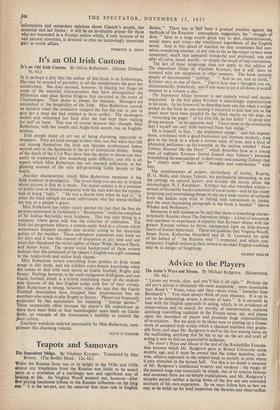It's an Old Irish Custom
It's an Old Irish Custom. By Olivia Robertson. (Dennis Dobson?. 9s. 6d.) IT is perhaps a pity that the author of this book is an Irishwoman. She may be accused of partiality in all the compliments she pays her countrymen. She does succeed, however, in placing her finger on some of the essential characteristics that have distinguished the Hibernian race since Scotus Erigena first cavorted at the court of Charlemagne. Their desire to please, for instance. Strangers are astonished at the hospitality of the Irish. Miss Robertson records an incident when the conductor stopped the bus she was in just to give her a meal she had omitted to have earlier. The passengers smiled and welcomed her back after she had kept them waiting for half an hour. This was of course because they thought Miss Robertson, with her tweeds and Anglo-Irish accent, was an English- woman.
Irish people make an art out of being charming, especially to strangers. They are kind enough to their own, too, but when they fall out among themselves the Irish can become professional haters second only to the Spaniards in the art of internecine dislike. Some of the deeds of the Civil War show that the desire to please can very easily be transmuted into something quite different, and this is an aspect which Miss Robertson has not stressed sufficiently in her glowing account of the only self-governing Celtic people in the world.
Another characteristic which Miss Robertson mentions is the Irish tendency to prodigality. The worst thing you can say in Ireland about anyone is that he is mean. The moral outcast is in a position of public trust in Ireland compared with the man who has the reputa- tion of being "tight." "He was a decent man when he had it," is often the local epitaph on some unfortunate who has spend-thrifted his way to a pauper's grave.
Miss Robertson has rather cutely spotted the fact that the first six persons mentioned in Goldsmith's "Retaliation" (with the exception of Sir Joshua Reynolds) were Irishmen. This was only fitting in a company where good talk was the criterion of admission. The Irish are gargantuan talkers, a custom easily bred in a climate which necessitates frequent escapes into taverns owing to the uncertain nature of the weather. These extempore arguments may keep on for days and it was this custom of discussion at any time and any place that sharpened the verbal agility of Oscar Wit*, Bernard Shaw, and James Joyce. The varied social background of these writers indicate that this command of the Queen's English was a gift common to the Anglo-Irish and native Irish classes.
Miss Robertson covers everything from politics to Irish street songs in .this book, and she exhibits extra-female knowledge when she comes to deal with such sports as Gaelic football, Rugby and Soccer. Hurling, however, is the really indigenous Irish game, and not Gaelic football, which is a hybrid combining many of the undesir- able features of the two English codes with few of their virtues. Miss Robertson is wrong, however, when she says that the Gaelic Football Association have dropped their preposterous ban on members who watch or play Rugby or Soccer. Players are frequently. suspended by This association for watching " foreign games." These suspensions often increase the player's life expectation as there have been three or four manslaughter cases lately on Gaelic fields, an example of the Association's inability to control the furor celtica.
Excellent woodcuts selected presumably by Miss Robertson, com- plement this charming volume. ULICK O'CONNOR
































 Previous page
Previous page